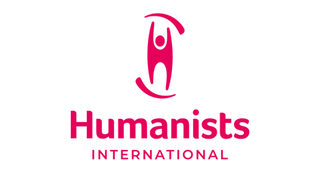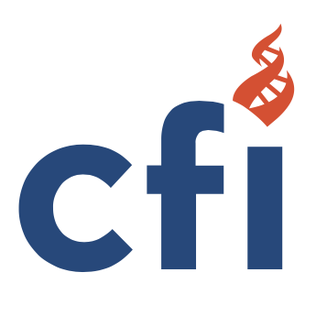Related Research Articles
Secularism is the principle of seeking to conduct human affairs based on secular, naturalistic considerations.

Secular humanism, often simply called humanism, is a philosophy, belief system or life stance that embraces human reason, secular ethics, and philosophical naturalism while specifically rejecting religious dogma, supernaturalism, and superstition as the basis of morality and decision making.

Religious Humanism is an integration of non-theistic humanist ethical philosophy with congregational rites and community activity which center on human needs, interests, and abilities. Self-described religious humanists differ from secular humanists mainly in that they regard the non-theistic humanist life stance as their religion while organizing with a congregational model. Religious humanism is sometimes referred to as non-theistic religion or congregational humanism. Other theistic humanist traditions have arisen over time, such as Christian humanism.

Paul Kurtz was an American scientific skeptic and secular humanist. He has been called "the father of secular humanism". He was Professor Emeritus of Philosophy at the State University of New York at Buffalo, having previously also taught at Vassar, Trinity, and Union colleges, and the New School for Social Research.

Humanistic Judaism is a Jewish movement that offers a nontheistic alternative to contemporary branches of Judaism. It defines Judaism as the cultural and historical experience of the Jewish people rather than a religion, and encourages Jews who are humanistic and secular to celebrate their identity by participating in relevant holidays and rites of passage with inspirational ceremonies that go beyond traditional literature while still drawing upon it.

Humanist Manifesto is the title of three manifestos laying out a humanist worldview. They are the original Humanist Manifesto, the Humanist Manifesto II (1973), and Humanism and Its Aspirations. The Manifesto originally arose from religious humanism, though secular humanists also signed.

Humanist Canada is a national not-for-profit charitable organization promoting the separation of religion from public policy and fostering the development of reason, compassion and critical thinking for all Canadians through secular education and community support. Humanist Canada was founded in 1968 and has grown over the past five decades to become Canada’s national voice of Humanism. Humanist Canada is an associate member organization of Humanists International. The official symbol of the organization is a modified Happy Human in a red and blue maple leaf.

Humanists International is an international non-governmental organisation championing secularism and human rights, motivated by secular humanist values. Founded in Amsterdam in 1952, it is an umbrella organisation made up of more than 160 secular humanist, atheist, rationalist, skeptic, freethought and Ethical Culture organisations from over 80 countries.

The Center for Inquiry (CFI) is a US nonprofit organization that works to mitigate belief in pseudoscience and the paranormal, as well as to fight the influence of religion in government.

Humanism is a philosophical stance that emphasizes the individual and social potential and agency of human beings. It considers human beings as the starting point for serious moral and philosophical inquiry.

The following outline is provided as an overview of and topical guide to humanism:

Thomas W. Flynn was an American author, journalist, novelist, executive director of the Council for Secular Humanism, and editor of its journal Free Inquiry. He was also director of the Robert Green Ingersoll Birthplace Museum and the Freethought Trail.

Andrew James William Copson, FRSA, FCMI, MCIPR is a Humanist leader and writer. He is the Chief Executive of Humanists UK and the President of Humanists International.

The Birmingham Humanist Group was formed on 23 May 1962 at the Arden Hotel, New Street, Birmingham, England, at a meeting convened by Dr Anthony Brierley. It changed its name to Birmingham Humanists in 2000 and voted to become a Partner Group of the BHA, which changed its name to Humanists UK in 2017. It holds most of its meetings at the rooms of the Community Development trust in Moseley, Birmingham.
Austin Dacey is an American philosopher, writer, and human rights activist whose work concerns secularism, religion, freedom of expression, and freedom of conscience. He is the author of The Secular Conscience: Why Belief Belongs in Public Life, The Future of Blasphemy: Speaking of the Sacred in an Age of Human Rights, and a 2006 New York Times op-ed entitled "Believing in Doubt," which criticized the ethical views of Pope Benedict. He is a representative to the United Nations for the International Humanist and Ethical Union and the creator and director of The Impossible Music Sessions.
Debbie Goddard is an American atheist activist and speaker, and the director of African Americans for Humanism (AAH). In 2019 she took on the role of vice president of programs at American Atheists. Since 2020, she has been on the board of directors of Humanists International.

Humanist Society (Singapore) is registered in 2010 as a society in Singapore for humanists, freethinkers, atheists, agnostics and other like-minded people. The non-religious make up 17% of the Singapore population as of last available Census in 2010.

Leo Igwe is a Nigerian human rights advocate and humanist. Igwe is a former Western and Southern African representative of the International Humanist and Ethical Union, and has specialized in campaigning against and documenting the impacts of child witchcraft accusations. He holds a Ph.D from the Bayreuth International School of African Studies at the University of Bayreuth in Germany, having earned a graduate degree in philosophy from the University of Calabar in Nigeria. Igwe's human rights advocacy has brought him into conflict with high-profile witchcraft believers, such as Liberty Foundation Gospel Ministries, because of his criticism of what he describes as their role in the violence and child abandonment that sometimes result from accusations of witchcraft.

David Pollock is a British humanist, and former President of the European Humanist Federation (EHF). He is also treasurer of the Education and Health Trust Uganda.
References
- 1 2 3 Jacobsen, Scott Douglas (2017-07-14). "An Interview with Kato Mukasa — Board Member, IHEU". Medium. Retrieved 2019-08-15.
- 1 2 3 4 5 Feni, Jean (2019-08-12). "The man who does not believe in God". The Observer (Uganda). Archived from the original on 2019-08-16. Retrieved 2019-08-14.
- 1 2 Fidalgo, Paul (2019-08-13). "The Morning Heresy: Cry Just As Hard As You Need To". Center for Inquiry. Archived from the original on 2019-08-16. Retrieved 2019-08-15.
- ↑ "Humanists remember two colleagues and friends from Uganda". Humanists International. 2018-08-15. Archived from the original on 2019-08-16. Retrieved 2019-08-15.
- ↑ Hurd, Steve (2018-05-20). "Mustard Seed School proclaims its Humanist Vision". Archived from the original on 2019-08-16. Retrieved 2019-08-15.
- ↑ "2014 Uganda Population and Housing Census – Main Report" (PDF). Uganda Bureau of Statistics. Archived from the original (PDF) on 12 October 2017. Retrieved 17 April 2018.
- ↑ "Humanist group needs help after robbery". Humanists International. 2014-07-11. Archived from the original on 2019-08-16. Retrieved 2019-08-15.
- ↑ "'We Can Now Afford To Dream Again' – How You Helped Humanists In Uganda". Center for Inquiry. 2014-10-08. Archived from the original on 2019-08-16. Retrieved 2019-08-15.